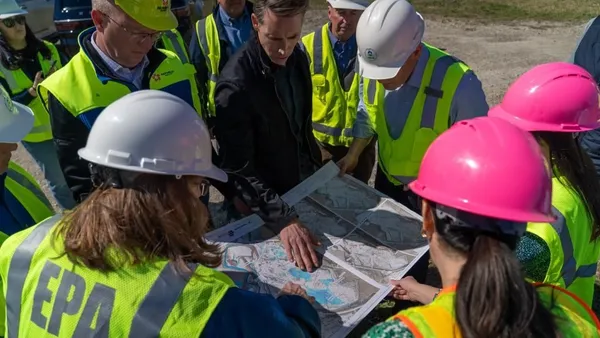Dive Brief:
- Connecticut's state bond commission has approved $750,000 in cleanup costs for five landfill sites previously operated by the former Connecticut Resources Recovery Authority, including two in Hartford and Ellington affected by per- and polyfluoroalkyl substances (PFAS). The state Department of Energy and Environmental Protection (DEEP) told Waste Dive a "small portion" of the overall funding will cover PFAS contamination.
- The new total approved Dec. 18 adds an additional $50,000 to previously allotted funds. DEEP oversees the landfills and has been supplying bottled water to two PFAS-impacted homes near the Ellington site while cleanup efforts are underway. Filtration systems will be installed to address the contamination, said Kristina Rozek, director of communications for DEEP.
- DEEP is in the midst of a legal fight with the Metropolitan District Commission (MDC), a nonprofit municipal corporation which treats the landfill leachate from the Hartford site, over PFAS contamination. MDC has previously argued DEEP owes $5.8 million in treatment fees. CEO Scott Jellison told Waste Dive in a statement "that the removal/reduction of PFAS does not mitigate the fees owed to MDC."
Dive Insight:
PFAS do not decompose in the environment and are linked to cancer and other health hazards. Unlike many other states grappling with PFAS contamination, Connecticut is largely reliant on incinerators and has no active MSW landfills. But, as evidenced by the new cleanup projects, the state is unable to avoid the issue because of its capped and closed sites.
Connecticut's PFAS task force, established by Gov. Ned Lamont last year, is closely studying the risks involved. Like other states, Connecticut may take action on regulating the chemicals before the U.S. EPA, which is under pressure to set a maximum contaminant level for any of the approximately 4,500 PFAS chemicals.
The substances are found in a range of everyday products — including items like jackets and pans — which makes their presence in waste inevitable. The state's task force has identified landfills, along with wastewater treatment plants, as a key source.
"[Connecticut should] sample and analyze various environmental media at and surrounding landfills using a tiered approach, prioritizing landfills located near potential human receptors," recommended a November action plan.
Rozek said that in addition to addressing PFAS contamination at the homes near the Ellington site, DEEP will also "evaluate the feasibility of groundwater treatment at the Hartford Landfill," including a focus on the chemicals. MDC has argued the state should take responsibility for PFAS contamination in that landfill's leachate, filing its latest lawsuit in September 2019 after an untreated sample showed high PFAS levels.
MDC previously sued earlier last summer as part of a long-running dispute over pricing. The commission raised sewer bills more than 2000% in 2016 in what it deemed a solution to prior underbilling. DEEP has rejected that characterization.
In a Dec. 11 reply to MDC's second lawsuit, DEEP asked a state court to dismiss the motion and argued MDC was attempting to use the PFAS contamination issue to gain leverage for its first suit. MDC maintains the issues are separate and indicated support for state PFAS cleanup efforts.
"It is our sincere hope that at least a portion of the $750,000 bond approved for landfill cleanup will be used to clean up and, going forward, treat and/or remove PFAS compounds and other contaminants from the landfill discharge before they are discharged to the MDC Sanitary Sewer System," CEO Jellison said.
The Hartford site includes the city's waste and recycling center, and has two onsite discharge areas, one for municipal waste and one for ash. Part of the December bond allotment will go toward repairing and replacing the landfill's leachate collection tank, as well as groundwater treatment monitoring efforts. Funding will also be used for upgrading wastewater systems, remediating erosion, repairing methane recovery devices, and other issues.














